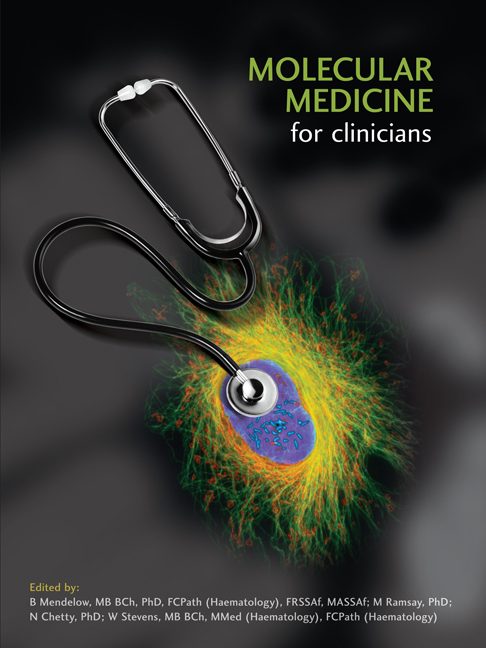Book contents
- Frontmatter
- Contents
- Foreword
- Acknowledgements
- Chapter 1 Introduction
- Keynote Essay 1: Defining Who We Are: DNA in Forensics, Genealogy and Human Origins
- Section 1 Principles Of Cellular And Molecular Biology
- SECTION 2 MOLECULAR PATHOLOGY
- SECTION 3 MOLECULAR THERAPEUTICS
- SECTION 4 RESEARCH AND THE CONTINUING EVOLUTION OF MOLECULAR MEDICINE
- Chapter 40 Approaches to Research in Molecular Medicine
- Chapter 41 Bioinformatics and Molecular Medicine
- Chapter 42 Personalised Medicine: Dream or Reality?
- Glossary
- Contributors’ Biographies
- Source Material And Recommended Reading
- Permissions And Credits
- Index
Chapter 42 - Personalised Medicine: Dream or Reality?
from SECTION 4 - RESEARCH AND THE CONTINUING EVOLUTION OF MOLECULAR MEDICINE
Published online by Cambridge University Press: 04 June 2019
- Frontmatter
- Contents
- Foreword
- Acknowledgements
- Chapter 1 Introduction
- Keynote Essay 1: Defining Who We Are: DNA in Forensics, Genealogy and Human Origins
- Section 1 Principles Of Cellular And Molecular Biology
- SECTION 2 MOLECULAR PATHOLOGY
- SECTION 3 MOLECULAR THERAPEUTICS
- SECTION 4 RESEARCH AND THE CONTINUING EVOLUTION OF MOLECULAR MEDICINE
- Chapter 40 Approaches to Research in Molecular Medicine
- Chapter 41 Bioinformatics and Molecular Medicine
- Chapter 42 Personalised Medicine: Dream or Reality?
- Glossary
- Contributors’ Biographies
- Source Material And Recommended Reading
- Permissions And Credits
- Index
Summary
Imagine a scenario in which you could predict your likelihood of getting a disease, accurately determine the unique biological characteristics of that disease process, suggest appropriate rationally designed therapy, and predict adverse effects of proposed treatment. Many of the chapters in this textbook provide evidence to suggest that this is more than a promise and fast becoming a reality. Progress towards these lofty goals has been aided recently by remarkable scientific achievements such as: 1) the completion of the human genome project and the realisation that genetic variation plays a significant role in deter mining susceptibility to disease and the likely response to its management; 2) understanding the important contribution made by epigenetics, with mediators such as methylation and histone modification, to disease processes; and 3) the discovery of microRNAs and their importance in normal physiology and disease. These factors together with the significant advances in the development of high-through put laboratory technologies have rapidly generated a host of new predictive sciences that includes genomics, proteomics and metabolomics among others.
These developments have resulted in the clinical laboratory and the pathologist taking an increasingly prominent role in the development of assays able to stratify patients into appropriate risk and treatment groups. In tandem with advances in laboratory techno - logy, a significant investment in bioinformatics and the development of sophisticated IT systems will be needed to facilitate translation of data into clinically meaningful algorithms. Remarkable advances have also been made in the field of radiology with molecular imaging techniques that use targeted drugs and have been useful for patient selection and monitoring response to treatment, furthering the personalised medicine approach.
Significant progress has been made in the biological characterisation of disease with technologies such as microarray technology leading the way, using either genome-wide RNA expression profiling or large-scale single nucleotide polymorphism (SNP) analysis using comparative genomic hybridisation (CGH) arrays or a combination of these methodologies. These techniques have been used to improve understanding of the underlying pathogenesis of a disease with the ability to differentiate distinct biological groups for the identification of either rational or novel treatment approaches. Many of these approaches have originally been evaluated in the oncology fields, where 1) the likelihood of mortality is high, 2) drugs are expensive and have a narrow therapeutic index, and 3) toxicities are common.
- Type
- Chapter
- Information
- Molecular Medicine for Clinicians , pp. 467 - 470Publisher: Wits University PressPrint publication year: 2008



